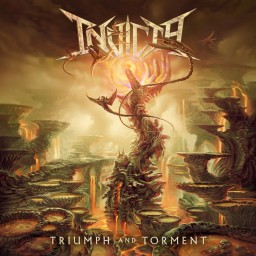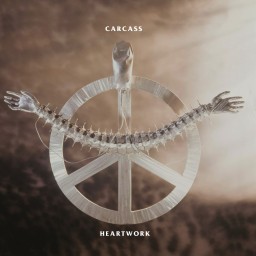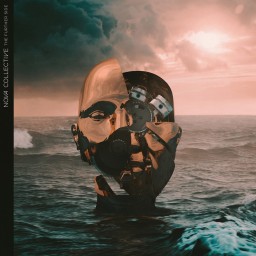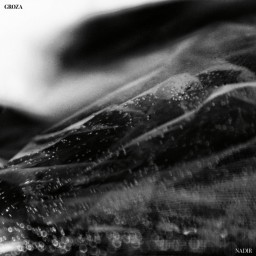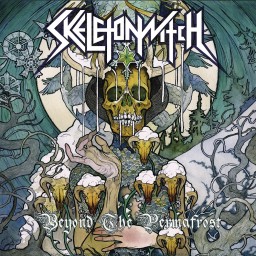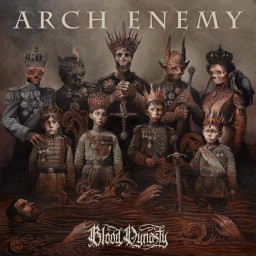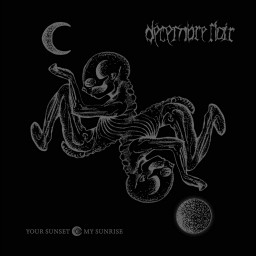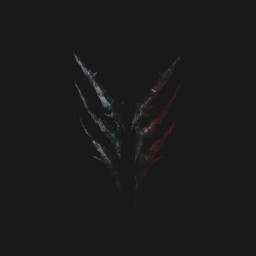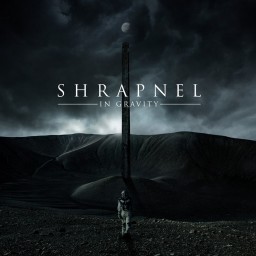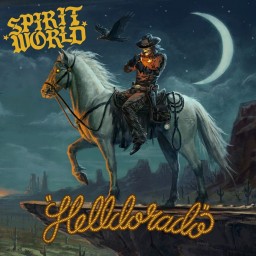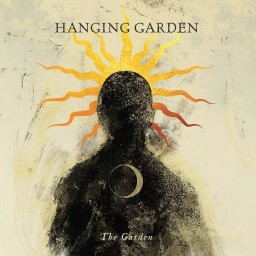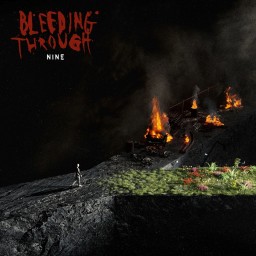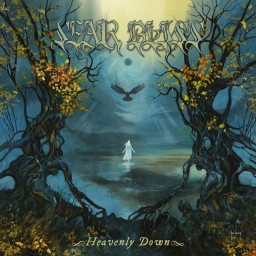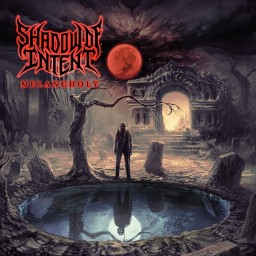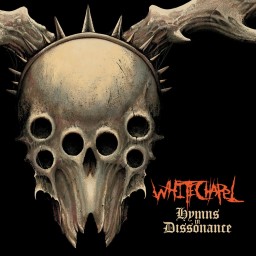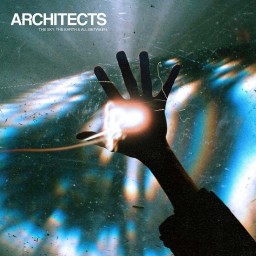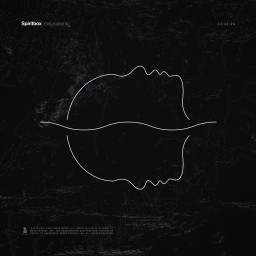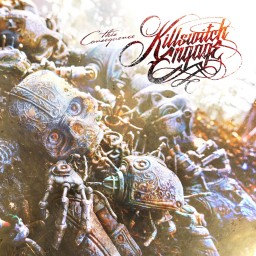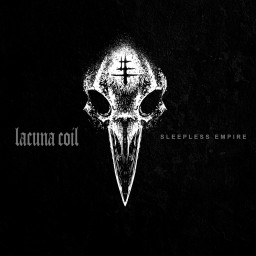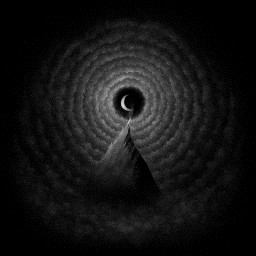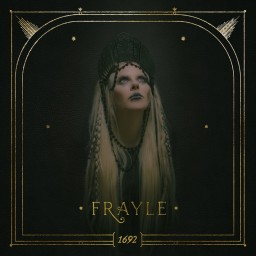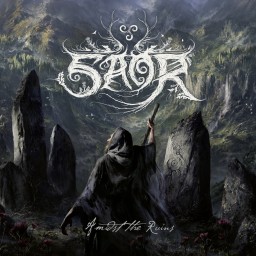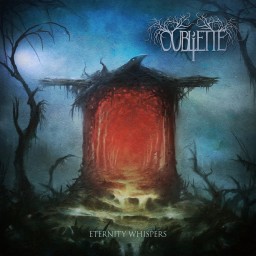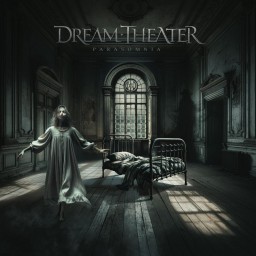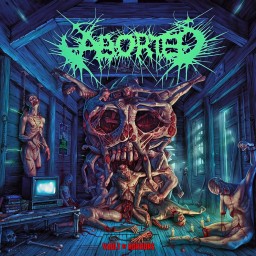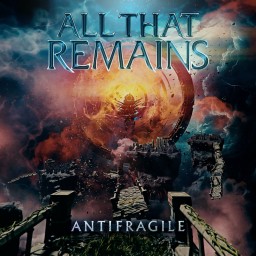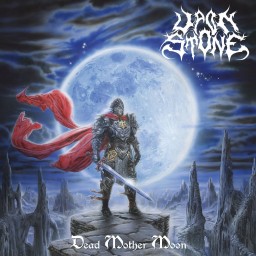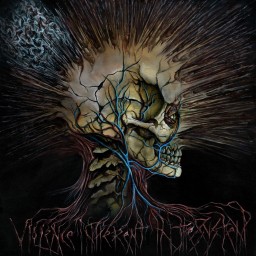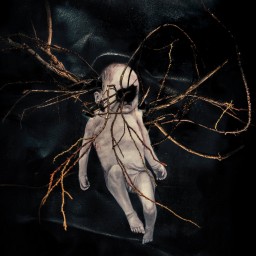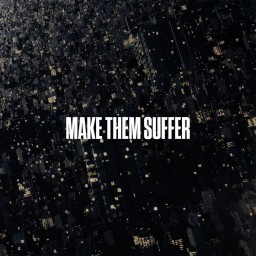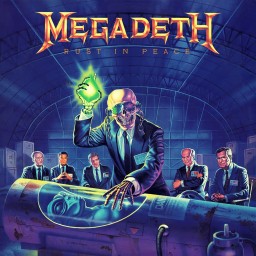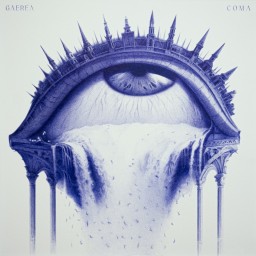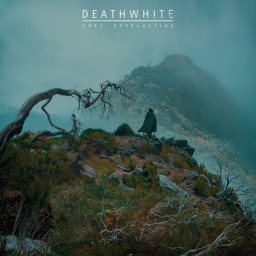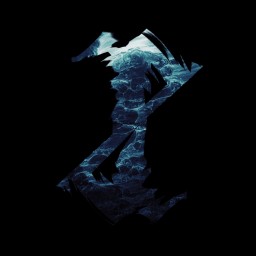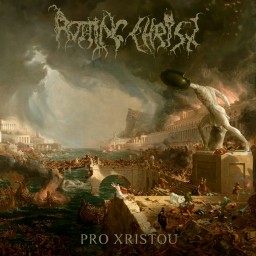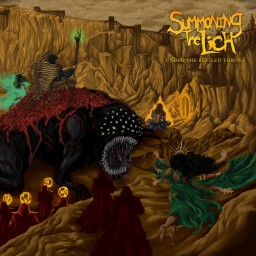Saxy S's Reviews
Alright, back to my Canadian thrash exploration.
I know its been a while since the last time I did one of these, but scheduling changes means that some trends that I really enjoy need to take a backseat for a little while. Invicta just happened to be one of those acts that just fell under the radar, but given the bands ability on this sophomore album, I'm shocked it took this long to get here. Triumph and Torment represents a side of thrash metal that I have been far more lenient towards in recent years, but also never got around to exploring the genre beyond introductions and passing recommendations. Technical thrash metal, like with tech-death, is a genre that is frequently paired with progressive metal since it borrows heavily from that genre with its uncommon time signatures, pin-point precise songwriting and guitar solo noodling. And Triumph and Torment does have plenty of that.
Where Invicta stick the landing for me is that these songs do not sound like a random assortment of riffs that were thought of once while jamming and the band decided they were going to include it on the next album. The riffing does change in style and tempo throughout each track, but they are never these one-and-done techniques employed by so many modern thrash metal acts. Not only are the riffs constant, and make the songs recognizable from one another, but they also rarely sound like audio whiplash. The obvious examples here are on "Embodiment of Infamy" and "Apprentice of Death" where the riffing remains strong throughout an entire tune and they don't resort to solo wankery to hide the fact that they don't know how to end a song.
The cause and effect of this is the songs on Triumph and Torment sound complete. It reminds me a lot of the classic Metallica records from the 1980s; tunes are undoubtedly extended, but as a listener, I never felt like I was wasting my time with these riffs. I could always count on Invicta on bringing back a strong chorus that would connect the extended verse/bridge back to the main theme. All the while it's being performed and produced with a remarkable consistency. The album does have a couple of hiccups in regards to loud/soft dichotomy between songs, but the sound of the record is not only ferocious, but powerful thanks to a strong bass foundation and a tasteful percussion element.
For me, it is records like Triumph and Torment that make me want to get back into the more extreme side of metal music. Because while this album does sound melodically pleasing, it is far removed from the Anthrax and Testament that I normally enjoy in thrash. As a soundscape, Triumph and Torment is closer to Vektor or early Revocation. Songwriting is closer to that of Kreator. With recent reviews for Skeletonwitch, Carcass and now Invicta, I can start to like technical thrash/death metal instead of just "appreciating" it. And with them being so close to home, I cannot help but wonder what kind of rabbit hole this may take me down.
Best Songs: Battle the Beyond, The Morning's Light, The New Throne, Apprentice of Death, Parasitic Reign
Genres: Thrash Metal
Format: Album
Year: 2023
I have been informed by many different subsections of the metal community that I am supposed to hate Sleep Token. That first statement alone is heresy since some don’t even consider Sleep Token to be metal at all! Sleep Token are a plant; a piece shoved into the spotlight by RCA records to bring heavier sounding music to the masses with the inclusion of smooth synths and trap beat percussion instead of the standard symphonic strings and glitchy industrial embellishments. I’m told to hate them because of their appearance; their anonymity and the world that they have created through their music videos, comic strips, visual novels, etc. I’m told to hate Sleep Token because Vessel’s vocals sound devoid of harsh screams and intensity, and the instrumentals are not these technical showpieces with blistering solos and relentless percussion. And, most of all, I’m told to hate Sleep Token because of their poser fanbase.
Sleep Token are an enigma, combining the universe building of Coheed and Cambria with the insufferable fanbase of Taylor Swift. This band has somehow managed to become more than just their music, while still living in a fantasy world that is isolated from our own. Audiences want to know more about the people behind the masks. Vessel and company are a lot like wrestlers; they need to live and breathe the character that they portray in the ring even when they are not wrestling to not break face. Imagine a meet-and-greet with a heel wrestler and they turn out to be the nicest guy in the world. Wouldn’t that…sour the image for you?
Anonymity becomes ever more important in 2025 with the rise of artificial intelligence and deepfakes. And Sleep Token, despite their best practices, still managed to get doxed by a parasocial fanbase prior to the release of Even in Arcadia. Some do not value other people’s privacy, and it does leave a bad impression on the rest of the Sleep Token fanbase that’s for sure, but what does Sleep Token have to do with it? They were the ones who were the most affected. Why should they be held accountable for their own audiences’ actions?
I’ve spent a lot of time talking about the entity of Sleep Token and not their music to start this review off (kind of proving my own point there), so let me just say this: Sleep Token are a better progressive band in 2025 than Dream Theater. Those who saw my review of Parasomnia know what I mean, but to those who missed it: Dream Theater have been running on autopilot for the last twenty-five years and have not done anything remotely progressive since Six Degrees of Inner Turbulence. Meanwhile, Sleep Token have taken a genre known for intensity, technicality and anger, and transformed it in a way that is atmospheric, moody and calm. Some elitists will suggest that Sleep Token need to be gatekept, but they aren’t really a metal band so what is there to gatekeep? Progressive music should defy categorization after all.
2023’s Take Me Back to Eden was a challenging listen. I really dug the promotional singles like “Chokehold” and “Vore” and ended up turning around on “The Summoning” later. However, the back half of that album was far too safe for the experience that the band was trying to portray, so I ended up enjoying it, but not over the moon for it. Even more so, the pop fusion made for a truly troubling experience, since pop and progressive music are not really known for their bountiful crossovers. Even in Arcadia had me worried with its promotional singles since I didn’t really like any of them, especially “Caramel”. I was worried that, like with Architects some three/four years ago, my defense of this band was going to be crushed by a lackluster project and that my review would be discarded in a cesspool of “sLeEp tOkEn aReN’t aCtUaLlY mEtAl” whiners.
The album opener, “Look To Windward” is perhaps the perfect encapsulation as to why so many people have a distaste for Sleep Token as a musical act. As a pop song, eight minutes is way too long for casual TikToker’s to stay engaged without a Subway Surfers video in the background, and as a metal song, the guitars and thall breakdown take up less than one-third of the song length. “No matter how you approach Sleep Token, everyone loses!” seems to be the consensus from both commercial and critical positions. But doesn’t that defeat the progressive argument? What happened to “it utilizes unorthodox songwriting featuring complex harmonies, multiple sections […] additional instrumentation such as keyboards, and influences outside of metal music?”
When I revisited the singles prior to this album and I tried figuring out why I didn’t enjoy them as much, I quickly realized that it was Vessel who was the problem. My favourite Sleep Token moments are the ones that use dynamic range, like on “Dangerous” to draft a story. So much of Even in Arcadia falls into this very monotonous vocal delivery that does not contribute in the way that it once did, even when the instrumentals are djent-y. Part of the reason I had to stop reviewing hip-hop albums on a regular basis was because not one could tell me a good story through the music. I understand that hip-hop is a very different genre from rock/metal since the words are given more importance than instrumentals, but if that’s the case, then why not just make it spoken word?
Getting back on topic, the instrumentals are a mixed bag. Songs like “Past Self” have okay introductions and set high expectations, only for the direction to just sit idly like a drone or doom metal album, not really evolving past its fundamentals. “Caramel” has this colossal soundscape that transitions from reggaeton beat, to a pop/djent chorus before concluding with alternating blackgaze riffs with double bass drum, open power chords and harsh screaming. Those screams are surprisingly quiet, but it beats the alternative of sounding like an auditory mess. Piano and strings are on the menu during “Even In Arcadia” as the albums interlude before the album takes on an uplifting texture the rest of the way. I for one was very surprised by main guitar lick on “Gethsemane” and reinvigorated the optimism for the final two songs on the album.
I for one am very appreciative of Sleep Token for how unapologetically not metal they are. The guitars serve more as textural emphasis in the same way that vocals work on an Unreqvited album. However, Sleep Token’s songwriting has taken one major setback on Even in Arcadia. This album has a lot of dynamic variety, but it always goes in one direction: soft to loud. This album has nothing like “The Summoning” or “Vore” which start intense and diminish in volume and intensity as the tunes progress. This is either a gross miscalculation on the part of the band and Carl Brown, or a lame excuse for songs to get more attention on streaming platforms like TikTok. Imagine the sheer horror on the face of some young teenager who just discovered Sleep Token through some viral trend, only to look up more of their music and be walloped across the face by “Vore” or something equally as intense. So, the formulaic calm opening to every song does feel like a wasted opportunity.
I liked Take Me Back to Eden two years ago but ended up going into Even in Arcadia with mixed emotions. And I came out the other side perhaps more mixed than when I went in. Is Even in Arcadia a good album? Yeah, probably. Is it as good as Take Me Back to Eden? Certainly not. And yet I want it to be. Not because it deserves it: the album is littered with curious design and ignorant omissions. But because of the inevitable push back this album is going to get. I discovered Sleep Token five years ago not through Tik Tok, but through metal forums that I frequent filled with people that would not shut the fuck up about them. Even going into this album, forums were littered with violent screeching from grown children who know metal music so much better than you or I. And you know what? Despite the album’s quality, I’m going to recommend it anyway!
This will be one of my most polarizing scores I’ve given to an album in quite some time; chances are I will look back on this review when the next Sleep Token album comes out and I still will not agree with the rating. Perhaps it is a bit of Stockholm syndrome on my part, so please consider this recommendation with some caution, but Sleep Token are making metal music for a new generation. It will not be for everyone, but in a great depression of Octane metal, with Sleep Token coming out and making something completely original, it deserves respect, if not admiration.
Best Songs: Dangerous, Gethsemane, Infinite Baths, Emergence, Even in Arcadia
Genres: Alternative Metal
Format: Album
Year: 2025
I discovered Carcass quite late into my exploration of death metal. Perhaps I was hesitant to check them out because of their goregrind roots, but 2013's Surgical Steel showed off a pristine side of the band that I resonated with. And given that Heartwork is considered one of the greatest death metal albums of all time, and that Vinny has selected it as the Horde's featured album for the month, it was about time for me write this review and listen to the album once again.
The first thing that I am reminded of when hearing "Buried Dreams" is the punk influence. Early death metal has plenty of plenty of hardcore punk roots, but not many of them explicitly name that influence like Carcass does here. You can certainly hear some of that Rites of Spring coming through in the grooves and riffing. Another aspect that I am reminded of is how wonderful the mixing is. Many older, cleaner death metal bands had a tendency to include strong bass presence in their mixing rather than letting the doubled guitars swallow the low end up. And Carcass leave lots of room for bass development throughout Heartwork.
This record is a divisive one for sure, and a fissure that we still see even more frequently today. Thinking back on the earliest, most successful forms of death metal (i.e. Death, Morbid Angel, Suffocation, Seven Churches) they could assault the listener with blast beats, palm muted guitar chugging and Cookie Monster vocals for an entire album and audiences would fall in love with its primitivity. Here comes Carcass, who started their careers in much the same way, only to replace those guitars with melodic leads, and more groove heavy drum lines. There is technicality on display (this is death metal after all), but it is used for embellishment rather than as a "look how much better I am at playing guitar than you" kind of way. A lot of metal fans view this as a sign of weakness; it's natural that we never want to see our heroes grow old, but that's just the way the world works. Athletes can't compete in their thirties/forties the same as they did in their twenties, and musicians aren't able to play at an intense pace for as long in the same way. Whether or not this stylistic change was necessary or intentional is irrelevant.
This is all a back handed way of saying that Heartwork represents a new era for heavy metal music and death metal specifically. The melodic sounds of Heartwork are taken a step further with the rise of Gothenburg death metal from At the Gates, In Flames and Dark Tranquility a handful of years later. And while I do like all of those acts, something about the intense side of death metal still brings a smile to my face. Heartwork's modulating styles and dynamics make it one of the better foundational death metal albums and continues to be a benchmark of sorts when it comes to balancing brutality with melody.
Best Songs: Buried Dreams, Heartwork, This Mortal Coil, Arbeit Macht Fleisch
Genres: Death Metal
Format: Album
Year: 1993
The texture of The Further Side will not surprise anyone who knows that Nova Collective is a supergroup featuring Haken's Richard Henshall, Between the Buried and Me's bass player Dan Briggs and Cynic drummer Matt Lynch. For the kind of album that The Further Side is, it is performed with the most pin-point of precision. Every piece of this record is deliberate and executed with grace. Production wise, nothing is out of place, Dan's bass work is splendid, the back-and-forth between the guitars and keyboards is well balanced and the drum work is technical, but not overwhelming to the listener.
I would be grossly remised however if I didn't bring up the songwriting, which is so boring and mediocre. The two chordal instruments does allow for Nova Collective to give the impression of something closer to jazz fusion with the textures, but the execution of these forms is uninteresting. There are solos for sure, but more often than not, The Further Side is a unified technical show piece, with modulating tempos, time signatures and styles. This record reminds me of the worst aspects of 2010s Opeth, when they were trying to be like pre-Moving Pictures Rush. But even the earliest Rush albums had decent hooks to latch on to to compliment Alex Lifeson's extended guitar solos. What does The Further Side have besides technical proficiency?
This is the kind of record that I know that I would have enjoyed if it was in Guitar Hero, like An Endless Sporadic's Magic Machine. But as someone who even less about technical demands in their progressive music, Nova Collective leaves me feeling empty. Of course it's impressive, but who is it meant to impress if not the band members themselves?
Best Songs: Cascades, State of Flux
Genres: Progressive Metal
Format: Album
Year: 2017
The two main comparison points that I had going into this third studio album from the German black metal project, Groza, were Mgla and Gaerea. I was a little skeptical at first since Mgla are just one of those bands that I could never get into. But Gaerea have impressed me with their recent output in recent years. I've seen Nadir in my recommended folder for quite some time now and finally found some time to give it a couple of spins. And the result was nothing short of fantastic!
Let's get one thing out of the way quickly: if you're expecting Nadir to be like the first two Groza albums, you might be letdown. The Mgla influence of the past has been mostly left behind in favour of more progressive/atmospheric black metal tendencies. What I really like about Nadir over Gaerea's Coma, also from 2024, is how it does not modulate into more death metal trends. That may seem hypocritical on my part since I generally praised Coma for its crossover appeal, but I would also argue that not every album needs to be a musical grab bag (i.e. Spirtibox's Eternal Blue, anything by Sleep Token) to be successful; sometimes it just takes a solid refinement of one sound and Groza nail it here.
And that comes through in the production. Nadir does not beat around the bush with its soundscape. It features guitars, blast beat percussion and black metal screams that are performed with precision and diction. The timbre of the vocals actually reminded me a lot of Svalbard's Serena Cherry so that is a plus for P.G. right out of the gate. The guitar is performed beautifully and the tremolo guitar leads are gorgeous; the mix uses just the right amount of reverb to make it sound cold and isolating, but not so much as if you're drowning in the ocean. The percussion can be relentless at times and only adds to the oppressive atmosphere of this record. The bass on this album is rather inconsistent though. Sometimes it can be really powerful, but others it just kind of disappears underneath a wall-of-sound. I have a pretty good feeling (although my understanding of mixing is quite limited) that devaluing the kick drum during the fast, double kick passages would have rectified this.
Nadir is exactly the kind of album that I wish for. Once a band who were just looking to get recognized, they mimicked a very popular black metal sound and received some praise. Once they reached a certain level of notoriety, they take that influences sound and mutate it into something that is still very much recognizable, but quite a way off the beaten path. Definitely a band I will return to in the future, as well as a band that I think even the staunchest of black metal traditionalists will enjoy.
Best Songs: Asbest, Dysthymian Dreams, Equal. Silent. Cold, Deluge
Genres: Black Metal
Format: Album
Year: 2024
During the first quarter of the 21st century, there has been no thrash metal band that has piqued my interest in the genre quite like Skeletonwitch. They have been one of my most consistently solid bands in the genre since I really started paying attention around 2007, and only grew in popularity for me when I started to embrace the more extreme of the metal subgenres around 2010. Skeletonwitch's brand of old school Iron Maiden riffs, modified with faster grooves, a healthy dose of death metal guttural vocals and a sprinkle of black metal tossed in just to keep you guessing. Beyond the Permafrost was not my first exposure to this band, but after hearing it in full again, it really gets to the crux of my main concern with thrash metal as a whole.
And that concern is in the songwriting. Yeah, I can admit that Beyond the Permafrost can be a bit one-note at times, especially the longer it goes on, but that one-note mentality allows for this album to be far more concise than a typical thrash metal album. Skeletonwitch do not waste any time here as songs are concise and poignant. Guitar does play an integral role here, but the guitar solos are quick, technically impressive and get us back to the meat-and-potatoes expediently, while the main riffs almost take the form of an earworm considering how many times you hear them played over such a short period of time.
Given that Skeletonwitch are not a full fledged tribute/homage band to the early "extreme" thrash giants like Slayer and Possessed, the album does have some variety. You will hear the occasional blast beat in the percussion, but they serve primarily as fills and embellishment rather than forming the grooves. What makes the comparisons make sense is when Skeletonwitch break out into a black metal riff with open chordal guitar harmonies and slower percussion grooves. While songs like "Remains of the Defeated" serve as too much of a good thing as well as an interlude, it isn't like the drastic style change is out-of-pocket, since Skeletonwitch have been embracing these types of grooves throughout the record.
One thing that I would love for Skeletonwitch to embrace would be a couple of longer songs to show off their songwriting capability over an extended timeframe. The bands most recent album, Devouring Radiant Light does exactly that and would serve as quality, complimentary listening material if you find this album to be too simple for its own sake. As for me, I like the simplicity of Beyond the Permafrost more than most and pieces of it reminds me of early Kreator and more recently, Power Trip and Enforced.
Best Songs: Sacrifice for the Slaughtergod, Beyond the Permafrost, Cast into the Open Sea, Soul Thrashing Black Sorcery, Within My Blood
Genres: Thrash Metal
Format: Album
Year: 2007
Arch Enemy return in 2025 with Blood Dynasty and I find myself rather impressed by what's on display here. For starters, when I reviewed Deceivers a few years ago, I heavily criticized it for its lack of originality. To me, Deceivers sounded liked a greatest hits compilation instead of a new album. In 2025, Arch Enemy are at least putting in some much asked about effort. Blood Dynasty shows off a full range of emotions throughout the runtime and it does lead to success...most of the time. It took a while for me to start enjoying the record since the opener "Dream Stealer" has an aura of progressive songwriting as it quickly modulates back-and-forth between about three different ideas that do not compliment one another. "Illuminate the Path" was a little better, but Alissa White-Gluz's clean singing comes out of nowhere and the whole track loses momentum after that. "March of the Miscreants" is when the album picks up and Arch Enemy do a solid enough job of keeping that intensity up until the final moments. Songs like "Vivre Libre" are better constructed for Alissa's clean singing, while "Paper Tiger" takes liberties from classic hard rock/heavy metal. And while it might sound extremely goofy at first, after the second or third listen, I really enjoyed it as a fully developed interlude.
While nothing on this album screams at me (besides Alissa herself I guess) that Arch Enemy are going above and beyond in the world of melodic death metal, I cannot deny that Blood Dynasty is quite a bit of fun. It still sounds like Arch Enemy, but it isn't status quo Arch Enemy in the same way that Will To Power and Deceivers were, and I greatly appreciate that.
Best Songs: March of the Miscreants, Blood Dynasty, Paper Tiger, A Million Suns
Genres: Death Metal
Format: Album
Year: 2025
Décembre Noir are a German doom metal band that have been learning a lot form the Officium Triste/My Dying Bride school of melodic death doom songwriting. And with Your Sunset | My Sunrise, Décembre Noir are doing all they can to bring the melancholy to you. I personally believe that while the production of this album is sparkling, some of the records more "extreme" elements can fell a tad overwhelming. They never get to the point of becoming overbearing or fully modulating this album into technical death metal, but the percussion is far more engaged in the song themselves than one might expect. Songs like "Your Sunset | My Sunrise" and the closer "Trivial Heart" have some enormous grooves, but Décembre Noir balance them out with some of the gothic tones that would not seem out of place on Hour of the Nightingale. The vocals are strong and have a really nice timbre; stylistically they vocals may seem to be a bit weak and lacking in presence, but the dark atmosphere helps to sell the despair that comes across through the vocal delivery. I personally would have liked there to be more tracks like "Trivial Heart", where the melody is consistent and built upon during an entire songs length. At only six songs, Your Sunset | My Sunrise tells a really good story and is a really good compliment to those artists mentioned previously.
Best Songs: Against the Daylight, Your Sunset | My Sunrise, Trivial Heart
Genres: Doom Metal
Format: Album
Year: 2023
I don't know what enticed Orbit Culture to begin their album with a constant pulsing of the Inception atom drop on "Black Mountain", but it sounded terrible and set a really bad first impression for their album, Descent. Unfortunately, the production blunders do not end here, as Orbit Culture are undoubtedly caught up in the metalcore/deathcore craze of blasting every instrumental part up to eleven on the soundboard, and letting all of the instrumentalists fight for their time in the spotlight. The percussion is severely overcooked; any time the double bass kick pedal takes shape, the sheer repetitiveness and rate at which they strike pushes everything else to the back. One moment that truly stuck out for me was during the second half of "From the Inside", which at first, I thought could be a pretty decent djent infused song. But then the softer bridge kicked in with this unsavory synth lead. This is followed by a return of the metal foundation, with vocals, and dueling guitar solos. It's just too much stuff going on and none of it is allowed to take center stage.
The albums length is also a big determent. Averaging five-plus minutes per song is not an inherent bad thing, but when more than half of them sound half cooked is when you know something is wrong. The album begins with "Black Mountain", which would have been okay if not for the Inception sound effects. Then both "Sorrower" and "From the Inside" are both over six minutes long, but the main idea ends after only four. That leaves Orbit Culture with another third of the song to fill in with other space. And, like in metalcore, that space is filled with an unrelated riff and an unprepared new melody. If you're band is going to do this, at least put in some effort to make the two parts work together. Otherwise, they just sound half-assed. When "Vultures of North", "Alienated" and "Descent" come on, they are stronger songs with good forms, okay melodies and a smaller collection of sounds conversing at the same time. The production is still hit-and-miss, but I'll take the positive songwriting over poor production.
But Orbit Culture keeps bringing back the patchy songwriting for the albums conclusion (and obnoxious instrumental choices) for the finale of the record and leaves this album feeling a little bit hollow. It's almost like the band wanted to try something more experimental, which I appreciate, but they didn't know how to do it well. Maybe this band should return to the basics of melodic death metal and really embolden their fundamentals before expanding further. I mean, they have already proven that they can with pieces of Descent, but now they need to bring them to the surface for a full album.
Best Songs: Vultures of North, The Aisle of Fire, Descent
Genres: Death Metal Groove Metal
Format: Album
Year: 2023
Not as bad as reviews on other websites might suggest. Shrapnel are a U.K. thrash band who have decided to go more mainstream with their fourth studio album, In Gravity. For starters, this is a huge departure for the band since it contains next to nothing in true thrash texture. This is much closer to mid 200s metalcore/post-grunge than anything in the bands previous discography. As someone who was not aware of Shrapnel before In Gravity, this actually doesn't bother me since I can view this album from a neutral position. Perhaps the album gets a bad reputation by putting two of its slowest songs, "In Gravity" and "Amber Screams" right at the top. The record does include some faster grooves and has some pretty solid ones too, such as "Breaker" and "Follow The Cold", but those seem to be the outliers in an album that is much more subdued than previous efforts. The vocals sounds like a cross between Alter Bridge's Myles Kennedy and Machine Head's Rob Flynn. And the instrumentals can be fun at times; as mentioned previously, some of the grooves are quite solid on the album, but they are at their best when they break away from the standard thrash or even nostalgic metalcore mold.
All that being said, this album fumbles the songwriting hard. As a former thrash band, I cannot say that I'm surprised. Some of the tracks on this record are painfully put together and have no real sense of direction. Even though I do like "Breaker", something about the final chorus feels off; almost like its missing a buildup to the chorus instead of just jumping right into it out of the bridge. Same can be said for "Guardian". "So Below" is arguably the worst culprit of disastrous songwriting, where the verse and chorus riffs do not coalesce together at all. They feel like two different songs that have been sheepishly thrown together in an attempt to save time, or to simply save the riffs from becoming forgotten B-sides. While I do appreciate the change in direction for Shrapnel on In Gravity, they lost their sense of identity, and showed the listener just how forgiving we (as listeners) are towards poor songwriting when the riffs are ferocious.
Best Songs: Breaker, Follow The Cold, Absolution
Genres: Groove Metal Metalcore
Format: Album
Year: 2024
Well I got this one wrong didn't I?
Returning to their atmospheric black metal form on records like Sunbather and Ordinary Corrupt Human Love, Deafheaven make their harrowing return in 2025. I heavily criticized the bands previous album, Infinite Granite, for axing its heavier sounds for its more post-rock style. Not because they were bad, instead because Deafheaven's principal feature was the uplifting nature of their black metal; a genre that is well known for being the antithesis of uplifting. I also said that I figured that this would be the direction that Deafheaven would continue down the foreseeable future.
Well that didn't happen. Lonely People With Power is a monstrous album in both its length as well as intensity. Like previous albums, Deafheaven are not going to overwhelm the listener with a typical black metal display of relentless tremolo picking, blast beats, and vocal screeching for just over an hour. The album is filled with atmospheric breaks and interludes, the metal portions are diversified with half-time style changes and more melodic guitar leads, as well as clean vocals. And as someone who cares very much about padding on an album, this record does not falter. There may be sections that could have been trimmed down (such as the intro on "Winona"), but overall, Lonely People With Power has enough diversity to keep it interesting, but without a lot of the self indulgence that plagues modern progressive metal.
The sound of this record is well done also. This is the first Deafheaven album published through Roadrunner Records. Now I've always viewed this record label as the "Gentlemen's Club" of metal record labels given their reputation. And even though Roadrunner is not particularly well known for its publication of black metal albums, Deafheaven fit right in. The albums have always sounded more mature and it continues here with the mixing. George Clarke's shrieking is still heavily condensed behind a wall-of-sound and acts more as a secondary instrument on songs like "Heathen" and it does work a little better than expected. Some albums like this put heavy emphasis on their vocals to make a statement, but here the vocals are more metaphoric in presentation and you don't really need them to get the full experience of this record.
All of that being said however, it's hard for me to enjoy Lonely People With Power more because it feels like Deafheaven are sinking into the status quo of modern atmospheric black metal. As I mentioned off the top of this review, Deafheaven are known for their uplifting textures and sharper tone quality. What I noticed here is that the tone quality has been quietly flattened; way more minor key signatures and chordal progressions, and more walloping foundational grooves. And even though the songwriting on this album is very good, it doesn't take long to realize that Deafheaven are seceding themselves to Alcest in that regard, when it was only a few short years ago their positions were reversed.
This is probably a nitpicky criticism of Lonely People With Power from me, but I think it is very important. The reason I constantly return to tracks like "Dream House" and "Canary Yellow" all of these years later is because of how unique they are within the black metal framework, and Deafheaven did this without incorporating a folk gimmick like Panopticon or Saor. Now, without that bottom line of "this is Deafheaven" for most of this album (only really saved by the final two tracks), it becomes harder to find songs here that are truly timeless. We shall see what the future brings but for now, Lonely People With Power is a good record and deserving of its early praise, but it should be a lot better.
Best Songs: Magnolia, The Garden Route, Body Behavior, Winona
Genres: Black Metal Post-Metal
Format: Album
Year: 2025
Ah yes, A Day To Remember. How could I ever forget? One of the 2010's most mainstream and pop friendly metalcore bands. They have returned with their first album since 2021's abysmal You're Welcome and showed just why ADTR (A Day To Remember) are so unnecessary in 2025. Here we have a band doing the exact same thing that Architects tried with their last album as they sheepishly modulate back-and-forth between modern metalcore trends, while staying close to their comfort zone that made them so popular with Homesick. And I guess on a purely sonic level, Big Ole Album Vol. 1 can be a promising listen. Unfortunately, ADTR have forgotten the most important part of easycore, which is the pop adjacent choruses. They might still be here in practice, but in execution, they are severely lacking. Some of them are okay (i.e. "Flowers" and "Miracle"), but more often than not this album turns into monotonous mush. Whether it be the painfully generic breakdown structure, the weak electronic percussion, the poor low end in the mixing, or the atrocious volume modulation that persists throughout the entire album! There is no way that anyone who has worked with a rock band before (or ever recorded anything in their life) would think that consistently adjusting a tracks volume in the middle of recording/mixing was a good idea. But, like Architects, it butchered whatever good graces the last three albums may have had, and mostly does the same here. The bands intent to not be taken seriously is at least a more promising takeaway than Architects, or any other modern metalcore act, but it does become less fun when the songs are this formless.
P.S. "Die For Me" is a poor excuse of a country rock crossover, probably due to the Hardy collaboration a couple of years ago. I would call it bad, but that would be too generous.
Best Song: Flowers, Silence
Genres: Alternative Metal
Format: Album
Year: 2025
The most recent album from Nordic progressive death metallers In Vain is quite the variety of sounds isn't it? While the album certainly retains its progressive tag throughout the hour runtime, the directions it takes to get there is quite varied. I really enjoyed the inclusion of a full brass section during the the albums highlight moments, such as "Eternal Waves" and "Shadows Flap their Black Wings". For an album that uses such a booming foundation, In Vain are not scared to embellish Solemn with bright/sharp tones; it gives the album a sense of direction that is not as dominant on other similar sounding death metal albums. The vocal styles change on a whim from Steven Wilson-esque hushed vocals, towering Einar Solberg cleans (complete with harmonic counterpoint), then alternating the rest of the time between low death gutturals and the occasional death metal screech. This all sounds like a lot to digest when you see it written down on a screen, but I promise that it is not as difficult of an album than I am describing it. In Vain have a skill of developing their foundation instead of becoming a new band on every track. It is also helped by the record not being quite extreme. At its core, Solemn is a death doom album with the occasional blast beat and tremolo guitar riff. This is what you might get if Wilderun and early Katatonia had a baby. The technique is solid too; granted the production might have a couple of minor hiccups here and there, Solemn remains incredibly consistent with its sound engineering. If anything, I think that the guitar harmonies might be a little too subdued throughout. I'm surprised it took me as long as it did to come around on this record, but I'm sure glad I did.
Best Songs: Shadows Flap their Black Wings, Season of Unrest, At the Going Down of the Sun, Beyond the Pale, Eternal Waves
Genres: Death Metal Progressive Metal
Format: Album
Year: 2024
I didn't go into Helldorado with the greatest of expectations. I remember this band and their 2022 album DEATHWESTERN being a very good (if a little same-y) novelty thrash album. The western/southern elements of that album appeared mostly in the lyrical content while the music itself remained quite bare. Well in 2025, Spiritworld will actually put some ambition into their music as "Abilene Grime", "Bird Song of Death" and "ANNIHILISM" show the band embracing a softer, country side.
Now, if you're expecting this album to be the thrash ladened beating of the last album, you might find Hellorado to be disappointing. But as someone who has continuously pointed out the flaws of novelty bands in the past, this might not be a bad thing for Spiritworld. It might make them a little bit more gimmicky as style changes from smooth and sultry sax solos ("Prayer Lips") back into thrash metal riffing ("Waiting on the Reaper") to black metal guest vocals on "Oblivion". However, the changeup in presentation is commendable. And it is not as if Spiritworld even needed to do this given that Hellorado is less than half-an-hour in length. For now anyways, the gimmick has not grown tired yet.
Best Songs: No Vacancy in Heaven, Bird Song of Death, Oblivion
Genres: Thrash Metal
Format: Album
Year: 2025
I did not listen to a lot of metal music in 2019. During that time I was firmly in my folk/americana era, where artists like Jason Isbell were my passion. When the year ended, I realized that I had listened next to nothing in the metal sphere, so I took it upon myself to search out some other rock/metal acts that released albums that released albums that year. Among those found were Altesia, Wilderun, and Hanging Garden. Now, I thought that Into That Good Night was an okay album; I liked it post-metal leanings, but was turned away by meandering song structures. Recently, I've started to embrace those blind spots in my metal listening and review more albums in genres that I don't frequent, such as Fallen pillars of doom and gothic metal.
With The Garden, I felt much the same way at the beginning. The title track is a solid opener with a good hook and great counterpoint between the clean singing and harsh death metal growling. But just when I thought we were getting another slow, melancholic tune as "The Garden" fades out, "The Four Winds" picks up the tempo and subverts expectations. It's not too much of a deviation in style for Hanging Garden, but it does allow for the return of the slower death-doom tempos to be more impactful on "The Song of Spring". I found myself really grooving with "The Fire at First Dawn" as the male vocals are sung in a clean timbre and the guitar is given more of a quasi-solo role.
I have a hard time rating this album any higher though. While I do find the album to be a fairly solid listen from top to bottom and there aren't any insultingly bad tracks here, something about this albums middle portion just does not resonate with me. I can tell that in some contexts, "The Nightfall", "The Stolen Fire" and "The Journey" are good tracks, but for me they just seem derivative. Maybe it was the vocal timbre, where the male vocalist options for clean vocals more, leaving the female vocalist as basically a background. Either way, it does not ruin The Garden that much and does make for a pleasant listen, but keep in mind that this garden might not be as lush as bands like Draconian or Swallow the Sun.
Best Songs: The Four Winds, The Fire at First Dawn, The Fireside
Genres: Doom Metal Gothic Metal
Format: Album
Year: 2023
The first new release from Bleeding Through in almost a decade, and my first exposure to the band since 2006's The Truth is a fun romp of death tinged metalcore. Bleeding Through are comfortable doing what they do best and Nine is a very comfortable slab of unapologetic 2000s melodic metalcore. But the band is also not so focused on the past that they cannot see what is going on in the world of deathcore at the moment, so they go the extra mile and add some bombastic symphonic sections. Some of them sound really good, others not so much. Personally, I found the symphonic elements of Nine to distract and become less impactful as the album continued.
Song wise, Nine has some decent choruses. Songs may be a little predictable, but at least Bleeding Through bother to add or subtract from the formula every once in a while to keep it fresh; whether that be adding a sung chorus, taking away a breakdown in favour of a more traditional bridge, or adding a guitar solo break. It keeps the album fresh, while also retaining the identity of the band in a way. I think that the band are stronger when playing more groove oriented tracks rather than the face melting thrashers, with "Path of Our Disease" standing out. The guest features are okay, with "War Time" sounding like a modern Shadows Fall song with I thought was pretty cool. Overall, the album is a little formulaic by Bleeding Through's standards, but they do enough to keep it engaging through a full listen. It has a couple standouts here and there, but the rest just sounds like modern metalcore slop to me.
Best Songs: Dead But So Alive, Path Of Our Disease, Emery
Genres: Metalcore
Format: Album
Year: 2025
Heavenly Down is the ninth studio album from the Hungarian black metal band, Sear Bliss, and the first since 2018's Letters from the Edge. Now I do remember hearing Letters from the Edge in passing during that year and I do remember enjoying my time with it, but I can also admit that I do not remember much about it. What I do remember is that while it was a very melodic album, it also ran long as it was more inclined to bleed into the atmospheric. Heavenly Down does still retain that atmospheric touch, but they have been forced into the background once again. This album is much more straightforward of a black metal experience in that regard. The songwriting is more refined and precise and is maintained by a wonderfully mixed bass line that carries this whole record forward.
I found myself locking in to the openness of the album. Lots of metal albums like to fill every single void with space through double guitar lines or synth breaks, but with Heavenly Down, that bass fundamental is paramount. The guitar during this record drops out a ton and it creates a new level of excitement and drive whenever it returns. The trombones on the other hand...
I think the band deserves credit for trying something new and I also believe that there are some moments when the trombone parts really emphasize the songs. Other moments sound really cheesy and blocky. The space ambient interlude "Forgotten Deities" would have been a great transition from "Heavenly Down" into "The Winding Path" if not for the trombones to ruin the calm moment with the blaring. And that is not to discredit the work or the timbre of the trombone's playing; it's just a loud instrument and during this passage, its presence was unnecessary.
Heavenly Down shows signs of brilliance in its songwriting; I really enjoy how the final track "Feather in Ashes" rounds out the album with a tempo, key and style that is reminiscent of the opener "Infinite Grey", while still retaining its melodic identity. I like the production of the purely black metal foundation, and I really enjoy the use of space throughout. However those trombones, while they have their moments, can also have moments where they feel like they've been added out of necessity rather than artistic purpose. Still, solid record from a severely underrated group.
Best Songs: The Winding Path, The Upper World, Feather in Ashes, Infinite Grey
Genres: Black Metal
Format: Album
Year: 2024
....Be honest with me here: does this review surprise you in the slightest?
Deathcore is such a tough genre to dissect since it borrows from two of the most frustrating genre's (death metal & metalcore) to create a new hodgepodge of sound. Some bands can do it well, while most others fail spectacularly. The main reason for these shortcomings come from a place of disregard for memorable songwriting in favour of sheer brutality. Like with Whitechapel last week, they were an act that could balance intensity with songwriting, but a long layover between releases means that someone has to come along and make quality deathcore.
Enter Shadow of Intent, a Connecticut based band that blended deathcore with both the melodic sounds of death metal from both Scandinavia and the United States, but also turned out to be incredibly influential in the rise of symphonic deathcore, anchored recently by Lorna Shore. While the bands first two albums are quite solid, there is a lingering feeling of timeliness to them; like if you don't play video games (Halo specifically), you will be left completely in the dark by both Primordial and Reclaimer. A band like Slugdge or Alestorm have become remarkably dull as they hold on to gimmicks far too long, but SoI (Shadow of Intent) dropped the theme from the previous releases and made something all their own with Melancholy.
You cannot really criticize SoI for leading the listener with false expectations on the opener "Melancholy". Everything you need from a symphonic deathcore band is here: string intros, palm muted guitar chugging, blast beats, varying levels of vocal range, and of course, breakdowns. But it also has a chorus, solo and the breakdowns stay in turn with the material that precedes it. It is nice to hear a breakdown for once that does not feel like it's disassociating from the rest of the tune. The clean singing during the chorus is a little offsetting; they remind me a lot of Cattle Decapitation's Travis Ryan and is the sort of nasal delivery that I will never understand its appeal.
"Oudenophobia" is the albums "ballad" so to speak. Not that such as thing can really exist on a death metal album, but the slower groove really stands out among the rest of the album. I found it to run a little stale as if it was an obligation rather than something put on the album with a lot of passion. The clean singing during the songs chorus does not sound quite as nasally as it has earlier on in the album. "Embracing Nocturnal Damnation" is a quick and brash change of pace as the main riff has tiny little influences to bands like Vektor and Revocation and embrace this bands technical side as well. I think having these songs back-to-back is a deliberate choice to put on explicit display the bands wide range of musicianship.
I would be remised if I didn't mention the ten-plus minute "The Dreaded Mystic Abyss"; my introduction to the band. As a progressive snob, as well as not a huge deathcore fan, this song surprised me in many ways. While I do think, after multiple listens, that "The Dreaded Mystic Abyss" is a little bit too overindulgent and does not stick the landing as originally thought, I still cannot deny the bands dedication to the idea. If there was ever a point on an album to be overindulgent, this would be the place to do it. After eight tracks of varying degrees of death metal, deathcore and symphonic metal, a ten minute guitar solo with style changes and two excellent grooves feels good. This is the kind of stuff that I meant when I reviewed Parasomnia so poorly last month. The ten minute, epic, progressive guitar solo becomes far more impactful when your band hasn't littered the entire album with it up to that point. If "The Shadow Man Incident" was an outlier, as "The Dreaded Mystic Abyss" is here, Parasomnia might have had a better fate. Instead, Dream Theater are dead, while SoI impress me with their vast array of sounds and styles. Unfortunately for the band, "The Dreaded Mystic Abyss" is not actually the albums last track, and returns to something more traditional with "Malediction" and really isn't that good to begin with, so it ends the album on a really weak note.
I think it was Daniel who pointed out in a Lorna Shore review a few years ago that the symphonic elements in deathcore sound remarkably cheesy, and at some points on Melancholy I can certainly hear that. I feel like the beauty in a record like Melancholy would be better presented through passages of silence, instead of littering every moment not filled with guitar, drums and voice with a string orchestra and choir. Some of them sound really good, and SoI sound even better when the symphonic elements are complimenting the death metal foundation. It does have its moments of being too much, but some of that can be mitigated by the more melodic death songwriting. This is a harrowing album that has many sparkling moments, but coalescing them into a whole can be tricky, especially when you consider the genres that are being merged here.
Best Songs: Gravesinger, Underneath a Sullen Moon, Dirge of the Void, The Dreaded Mystic Abyss
Genres: Death Metal Metalcore
Format: Album
Year: 2019
You always remember your first right?
My introduction to deathcore was This is Exile in 2008. Having not listened to anything heavier than Machine Head or Lamb of God at that time, I felt isolated by that album at first; even to this day, I'm still perplexed by it. Perhaps it was because of lowered expectations by the other similar bands from that time that This is Exile became my foundational deathcore album that I compare all others to.
In the years since, Whitechapel have gone on some wildly different directions. They created an alternative death metal album with The Valley and then doubled down and added progressive techniques with 2021's Kin. But in 2025, I could tell that something was up. For starters, Whitechapel have changed their nameplate back to the original, a moves that typically marks a rougher shift in tonality. "A Visceral Retch" was promoted in preparation for the new album and my hardcore friends lost their minds. And then those same friends bombard me while I'm on vacation telling me "IT'S THE ALBUM OF THE YEAR!" so I guess I'm caving. What do I think of Hymns in Dissonance?
"Prisoner 666" begins very ominously, before an explosion of sound hits your ears with a riff that is all too reminiscent of "The Saw is the Law". As the album carries on, it becomes apparent that Hymns in Dissonance is not trying to be Whitechapel status quo. While this album might be listed exclusively as "Deathcore" on RateYourMusic, that is not to say that the progressive metal from the last two albums is not present here. Listen to those choruses on "Prisoner 666" and "Hymns in Dissonance" and tell me that power chord accompaniment isn't inspired by Ne Obliviscaris or the recent Job for a Cowboy record Moon Healer.
It's apparent within the first two tracks with extended runtimes as well. A shade over five minutes might not seem like much to the progressive metal snob, but to a hardcore fan, this is heaven. And it is of course a very good thing too when the songs are well composed also. I enjoyed how the "breakdowns" on songs like "Diabolic Slumber" are presented and executed; like with Spiritbox just last week, breakdowns are connected to the material preceding it and makes these songs feel complete. Whereas songs like "Hymns in Dissonance" leave a lot to be desired with their outros. The back half of the album is far less progressive following the "Ex Infernis" interlude and, while a fun listen, leaves me with little to talk about. Very heavy deathcore feel, but brought into the modern era.
The album closer "Nothing Is Coming for Any of Us" confirms what I already suggested earlier in this review. Hymns in Dissonance is not Whitechapel remaking This is Exile in 2025. This is an album that has taken the lessons of those progressive albums like The Valley and Kin as well as the state of deathcore in the current day, while also adding some of the classic Whitechapel sound that made them such a household name in the scene nearly twenty years ago. The first half of the song uses the "breakdowns but slower" technique, while the second half turns into a instrumental feature. I'm not a fan of either of these two parts to be honest, but it is quite the change of pace from the run of songs that led up to this moment, and I appreciate the ambition.
Perhaps the record would be better with a cleaner production. Now, I should expect less given this is a Metal Blade production, but even the earlier Whitechapel records produced through this label didn't sound as overblown as this. Part of that likely comes from the instrumentation, which contains three separate guitar players. The reasoning has always been so that Whitechapel can play these songs without compromising during live sets, which is fine. But whenever the band has one of those patented vocal breaks, every single time the instruments return the mix warbles from the intensity and volume. It does get slightly better during the back half of the record, but it still creeps its head during every breakdown.
That mixing is what's gonna hold this back for myself and likely many others. Because on songwriting alone, Hymns in Dissonance is quite good. Whitechapel haven't sounded this angry since the self titled album and they've managed to merge it with their more progressive songwriting of the 2020s. Phil Bozeman has one of deathcore cleanest vocal deliveries, but even I had a harder time than usual trying to hear the words that were being said. If you want a real hardcore thrasher, I can see why you might consider this as your album of the year; this is very much the opposite to Lorna Shore's Pain Remains.
As for me, I can't hate this, but I don't love it. Hymns in Dissonance is the kind of record I hoped Moon Healer might be with its aggression. There are flashes of excellence here, but they are harder to see through the dark clouds.
Best Songs: Prisoner 666, Diabolic Slumber, Hate Cult Ritual, Mammoth God
Genres: Metalcore
Format: Album
Year: 2025
BREAKING NEWS: Architects are heavy again.
This really shouldn't be news to anyone considering how poor Classic Symptoms of a Broken Spirit was. I had low expectations for an Architects album already and then Sam Carter and company dropped the biggest non-effort I've heard this side of the 2020s. It was right up there with Bastille as my worst albums of 2022 and for good damn reason. It was a record that promised accessibility, but butchered whatever character Architects may have had. Classic Symptoms of a Broken Spirit did not sound like an Architects album, but rather a procedurally generated alternative metalcore album that could be replicated by anyone.
The issue is not that Architects are going back to a heavier sound. What matters is will Architects actually sound like Architects? And so, The Sky, the Earth & All Between does show signs of improvement. Segments of "Elegy" and "Brain Dead" show the band embracing more of a hardcore sound. "Whiplash" and "Everything Ends" are closer to the mainstream accessible sound the band has been playing with for the last couple albums, while "Evil Eyes" has some decent hybrid action going on. The biggest issue with this album is that it lacks consistency; I like "Evil Eyes" and the opener "Elegy", but then the album hits you with "Broken Mirror", which I swear just sounds like a rejected Bring Me the Horizon song.
The back half of The Sky, the Earth & All Between is so safe that I don't really have anything to say about it. The Amira Elfeky feature on "Judgement Day" could have been a bright spot for this record, until the main riff enters and it reminds me of AI generated metalcore again. The worst part about it is that none of these songs have anything ear catching; whether that be a catchy chorus, guitar solo, or compositional change of pace. They all do the same thing and a record that started off with potential gradually loses that momentum in quick fashion.
Now, I understand that it is unfair to criticize The Sky, the Earth & All Between by comparing it to Holy Hell, the band's 2018 record that served as a farewell/lament to their bandmate, Tom Searle. I really question just how much weight that must have carried because while this album does certainly sound like Architects, it also does not contain the same passion. And even then, this album is showing signs of a group desperate to stay relevant, and will incorporate as many modern trends into their music to do so. Some of them work, while others just...don't. Perhaps it is poorly outlined expectations by people like myself that an artist does not need to completely revamp their sound every album. Sleep Token are Sleep Token, and they do not need every 2010s metalcore group mimicking their style to maintain relevancy. Instead of being good at just one thing, Architects' The Sky, the Earth & All Between includes The Sky, the Earth & All Between, and isn't really good at any of it.
Best Songs: Elegy, Brain Dead, Evil Eyes
Genres: Alternative Metal Metalcore
Format: Album
Year: 2025
Spiritbox have returned with their second full length album following The Fear of Fear EP from 2023. The first thing that strikes me on the new record is how much heavier this is than Eternal Blue. The promotional singles for this record did not leave me with much hope. The promotion for Tsunami Sea was showing signs of this band continuing down the more accessible path with "Perfect Soul" being thee prime example. While not a bad song, it does sound eerily similar to some of Eternal Blue's weakest songs.
So having been on vacation for the last week, I've had the chance to listen to this record freely for longer than most, and I was quite impressed with the result. This is by far the best project that Spiritbox have released since the 2017 EP. Even though the record does still implement many of the talking points that I've previously mentioned (most notably the "musical grab bag"), Spiritbox have claimed an identity and they are sticking to it throughout the entire album. The bands hybrid personality has become apart of their unique sound and that carries into the songwriting itself. This album has such a eclectic palette of song styles, song compositions and directions. And while some of them don't work (i.e. "Crystal Rose"), other songs like "Keep Sweet" and "A Haven With Two Faces" are very good.
Tsunami Sea is adding a few more electronic and industrial elements, which is new for the band and plays into that "grab bag" personality the band is presenting for themselves. In a way, this album can be seen as some kind of culmination of taking Iwrestleabearonce and making it accessible. On their own, none of these songs scream progressive or event avant-garde, but as a whole, Tsunami Sea does so much to change up from track-to-track that it gives off the passing impression of a progressive metal epic.
"But Saxy" I hear you moan, "what about the breakdowns? This is metalcore after all and you are a notorious hater of breakdowns." And while that may be true, it is only because modern metalcore bands do not know how to include breakdowns into a tune; insert a percussion buildup, a vocal break where the title of the song is shouted, band returns with a breakdown groove that is not connected to the chorus. And while Spiritbox do employ this mechanic here, it is breakdowns like on "A Haven With Two Faces" that make me think this band really are metalcore geniuses. The pure bliss that was felt as Courtney LaPlante sings "I watch as it floats backwards to me" and the seamless recurrence of the main band is the highlight of the album for me.
Like I said off earlier, I think Tsunami Sea is the best Spiritbox record since the debut EP. The songwriting has improved tremendously, the album has a great variety of song styles, both in their aural presentation as well as the physical compositions. LaPlante's vocals are tremendous their range and delivery, and while the compression of the mix is a questionable choice, I feel like it adds to the groups dynamics during the records softer moments, as the heavier moments can sound tremendous at times. Like with all metalcore, the best waves are the ones that make you savor them.
Best Songs: Fata Morgana, Keep Sweet, A Haven With Two Faces, No Loss, No Love, Deep End
Genres: Alternative Metal Metalcore
Format: Album
Year: 2025
Killswitch Engage are one of those rare old breed of bands that understand the importance of delayed gratification. They have never been a band that have forced an unnecessary number of albums out the door in order to maintain relevancy in the ever changing metalcore world. And as a result, whenever Killswitch Engage release a new album, it's always welcome with praise and admiration, even if it is just the band on autopilot.
This time around, the album This Consequence has a five year window since Atonement, which I reviewed back in the day. When I reviewed it, I thought it was okay, but far too predictable. Howard Jones making guest appearances was memorable, but couldn't hold the album back from mediocrity. This Consequence meanwhile has some modulation from the typical KSE (Killswitch Engage) formula. The songs "Aftermath" and "Forever Ahead" nicely compliment each other in the track order with warmer textures and more melodic singing. While "Collusion" and "The Fall of Us" coalesce into heavy overload; with "The Fall of Us" in particular beginning with a black metal adjacent riff, before returning to some stronger death metal riffs during the verses.
It isn't all sunshine for KSE. I for one was very disappointed by the overall sound of this record. The compositions are good, but the engineering just holds back on so many fronts. The first, and most obvious one, is the underdeveloped the low end of the mix. "The Fall of Us" is a perfect example of a song that desperate needs that strong foundation, when the lead guitar is tremolo picking. While the rest of the mix is slightly better, its only because the rhythm guitar remains present during the choruses of "I Believe" and "Broken Glass". KSE really needs to bring back that booming foundation that was so present on The End of Heartache or As Daylight Dies.
All of this said, I do believe that This Consequence is the best KSE since the return of Jesse Leach. It sounds like KSE, but it also sounds developed and the progression of Killswitch Engage as being more than just THE melodic metalcore band. They have the potential to add more influence into their music and have it sound pretty good as well. If they could do that with better mixing, This Consequence would be fantastic. But it is still quite the solid piece of melodic metalcore in the 2020s.
Best Songs: Aftermath, Forever Ahead, Collusion, Broken Glass
Genres: Metalcore
Format: Album
Year: 2025
With all due respect to the bands previous catalog, it really is nice to hear Lacuna Coil returning to their roots of Comalies and not trend chasing. The bands previous number of records have all been plagued by trying to be something that Lacuna Coil is not. Whether it be the nu metal on Karmacode, or the atrocious metalcore breakdown chasing of Delirium.
This is not to say that Sleepless Empire isn't a little bit indulgent. "Scarecrow" does begin with a very metalcore-esque riff, but Lacuna Coil are confident enough in that riff to make it a foundational piece instead of your typical ping-pong of riffs and never sticking with one. Cristina Scabbia's vocals are pretty bland if I'm being honest; while certainly some good moments, the main vocal melodies of quite a few tracks are monotonous. What that means is a lot of the main hooks come from the instrumentals. The riffs still have that metalcore foundation, but the inclusion of synthesized strings and orchestral arrangements do bring back images of the bands strong gothic roots.
But the harsh vocals are a lot to take in. They add some intensity to the record that only appears in short bursts on records like Karmacode, but now they are a big part of the tunes. Reminds me a bit of Color Decay by the Devil Wears Prada and does run its course after a while and becomes predictable. The real issue though is when you have a Randy Blythe feature ("Hosting the Shadow") and it doesn't really need to be here. Sleepless Empire is already close to 50/50 on vocal splits, so the appearance of a guest vocalist (with a very similar vocal timbre might I add) is just odd choice and adds nothing. The track itself is one the albums faster paced tracks (good) and the one that exhorts the least amount of gothic metal energy (not good).
In the end, Sleepless Empire would be best described as an album in much a similar way. For every step forward the band takes (i.e. gothic revival, decent choruses, solid production), Lacuna Coil are just as likely to take a step back (i.e. 50/50 vocals, metalcore trend hopping). I think that the album does more good than bad, which is why I'm giving it a more generous score, but some really foundational issues continue to hold this band back from their true potential.
Best Songs: Scarecrow, I Wish You Were Dead, Sleepless Empire
Genres: Alternative Metal Gothic Metal
Format: Album
Year: 2025
The second of my most anticipated early black metal albums for 2025 is Ottawa's Unreqvited. I've been lauding this ensemble since Empathica in 2020 and 2021's Beautiful Ghosts was a atmospheric/post-metal marvel. I always appreciated how well the songwriting here was above all else, especially since the band always did it without traditional vocals. Rather than using words to depict meaning, the voice was always used as a complimentary instrument, which highlighted both the brilliant instrumentation/production, but also the focus squarely on the melody.
But in 2024 that changed. "The Starforger" was to be the first promotional single for A Pathway to the Moon and it surprisingly featured spoken word vocals. And while my initial reaction was trepidation, I did come around to them. "The Starforger" has all of the mannerisms that one would expect from an Unreqvited song. But within the context of the album, the consistency just isn't there. For some reason, the heaviness that persists on "The Anitmatter" just does not pair well with the vocal timbre, and it may leave some questions as to how these two songs can be paired together on the album? It isn't that the vocals are bad, but the cleanliness in some of the execution just feels off. Unreqvited have always pride themselves on dreamlike atmosphere, so a cleaner, almost metalcore production can be a huge red flag for some.
Unreqvited are not well known for their pummeling black metal roots; instead choosing Alcest tempered shoegaze for their foundation. And the foundation here is still wonderful. Some of those melodic lines on "The Starforger" and "Void Esssence/Frozen Tears" are enough to make even the most stone faced of metalheads fall to their knees and weep. And they always manage to do it with fantastic production. I know I'll be in the minority here, but I for one really enjoyed the 90s R&B synth infusion on "Departure: Everlasting Dream" (hello Sleep Token) and much of the albums more traditional synth work on "Into the Starlit Beyond".
But where the album loses me is the pacing. I always preface this by saying songs like "Into the Starlit Beyond" and "Departure: Everlasting Dream" will sound wonderful on their own, but as apart of a record, they do fall flat. This fumbling occurs because Unreqvited have too many softer, post-rock tracks in a row and the intensity of A Pathway to the Moon just grinds to a halt. Perhaps this is conceptual; as a matter of fact, the entirety of this album has the perception of becoming consistently slower from "The Antimatter" all the way to its conclusion. But even by those standards, this record could use a jolt of energy interspersed between the final three tracks.
The ending is a stylistically appropriate touch where Unreqvited revert back to textural singing and end the album on an uplifting note. Beautiful Ghosts was a record that found me at just the right time. It was a record that had no explicit meaning or themes, but given my position in 2021, Beautiful Ghosts left me breathless. In 2025, A Pathway to the Moon does not find me at such a vulnerable time, so it's easy for me to criticize it more for its shortcomings. Bur even at its worst, A Pathway to the Moon represents another wonderful album, one that I will gladly take the cosmic journey again.
Best Songs: The Starforger, Void Essence/Frozen Tears, Into the Starlit Beyond, Departure: Everlasting Dream
Genres: Black Metal
Format: Album
Year: 2025
The debut album from Clevland's Frayle is an odd listen. On one hand, I do enjoy the overall soundscape of 1692, the dreamy, doomgaze atmosphere is executed quite well and the ethereal vocal timbre of Gwyn Strang only emphasize this style. The dirge songwriting can become a little boring at times, but I think that is an general issue with doom metal as a whole. Either way, on this record the lack of rhythmic variety does cause some of the tunes to blend together after a couple listens.
This album major downside however is just how safe it sounds. While the record is pretty, it is lacking in true grit. I guess that is maybe part of this albums appeal, with its occult and anti-religious themes, but even then, the album can be a little dull. Songs like "Darker Than Black" and "Burn" have decent hooks, but some songs like "Godless" just run like a monotonous drone with no sense of direction. Maybe that makes the albums biggest issue the pacing? That sounds about right! The pacing of 1692 is a mixed bag, starting off fairly well with "1692", then adding harsh vocals on "God of No Faith" that don't flatter this style of doom metal, then a couple decent hooks and then record drones to its end. For an album that's only thirty-seven minutes, that kind of pacing is a monster problem.
Might be worth checking out if your curious for some doomgaze, but there are certainly better options.
Best Songs: 1692, Darker Than Black, Burn
Genres: Doom Metal
Format: Album
Year: 2020
At the moment of writing this, I am sitting at my back window, staring out into the public park behind my home, enthralled by the sight of anywhere between 15-20 cm of snow, perfectly still, almost foreboding in a way. Suffice to say that I was in the perfect conditions to listen to the new Saor album. When I discovered Andy Marshall's Celtic/black metal band in 2016, it came at a wonderful time. I had just completed my undergrad and had spent the better part of two years not listening to any metal. That's when Guardians arrived and I was taken away to the plains of Caledonia and its atmospheric beauty, complimented by a monstrous album.
I understood many of the detractors on Saor's previous album, Origins. It was less so a black metal album and dug its feet in with its Celtic folk roots. And while I never saw that as a bad thing, the songwriting did take a noticeable downgrade. And the first thing I noticed when turning on "Amidst the Ruins" for the first time was how well the folk roots blended with the revived black metal framework; it's even better than before! The hook on the title track is not only vibrant, but also carries a lot of weight through the entire thirteen minutes. Carrying into "Echoes of the Ancient Land", the grandeur picks up with lots of countermelodies flowing through the track. The harsh/clean vocal combo sounds wonderful and not indulgent in the slightest.
The one true issue I have is the interlude "The Sylvan Embrace" although calling it an interlude might be a misnomer. This track is over eight minutes long and, while beautiful, does not need that much time to simmer. This is Andy Marshall's longest album since Guardians so I understand the need for a reprieve. But Saor have never been of the brutal style of black metal that you might expect from Watain or Spectral Wound. For something as melodic and pleasant as this, I don't really see the need for extended breaks like this one. By comparison, "Exile" on Forgotten Paths would have made for a more acceptable length of break here.
"Rebith" lives up to its title by channeling a similar energy to "Monadh" from Forgotten Paths as well. It's pretty much two songs in one and both halves are given love and care. The first half brings back the black metal weight that was missing following "The Sylvan Embrace" and might be the most intense song that Saor have ever produced. The second half is this simple melodic motif that gradually swells over time and transforms into an epic conclusion. I will say that I think "Rebirth" ends a bit abruptly? I know, it just feel like with Parasomnia, this album should release its epic conclusion onto us in those final five minutes, but it leaves a bit more modest than I would like. Saor should leave the listener with a sense of wonder instead of wondering.
I will admit, like with Origins, I don't think this album is bad. In fact, I would say that Amidst the Ruins is the proper comeback that fans of Andy Marshall deserve; a more revived focus on the atmospheric black metal, with a newly invigorated take on Celtic folk music. And each song has its truly epic moments in them. But as a whole? Amidst the Ruins loses steam in its final two songs. I'm still gonna bite the bullet and buy this record on vinyl and give it a high score, claiming it as one of 2025's first essential listens, but if I'm in the mood for Saor, I might go back to older albums like Guardians and Aura first.
Best Songs: Amidst the Ruins, Echoes of the Ancient Land, Glen of Sorrow, Rebirth
Genres: Black Metal
Format: Album
Year: 2025
For once, my Spotify algorithm doesn't dogpile with endless droves of AI generated music and the same three albums since 2015. Oubliette originate from Tennessee and are quite small in their reach, with only a couple thousand monthly listens. For the bands third album, Eternity Whispers, the atmospheric, melodic sound has been tampered with in favour of some more death metal tendencies. Even though I would consider them as primary touches to enhance the album, the black metal portions are exquisite. I really enjoy the melodies in the guitars and how they modulate from tremolo picking leads to arpeggiated post-metal breaks. They create an excellent change in timbre as the percussion acts much the same way. Some slower grooves, some heavy blast beats as well as passages where the drums aren't playing at all. The vocals sound good mostly, my one issue with Emily's singing is that it can be a mixed game where sometimes they sound pronounced and explicit, while others, such as on "Dreams of Nevermore" they can be pushed pretty far back in the hierarchy. The album has an instrumental ("Ember's Embrace") that features Ben Karas from Thank You Scientist, and the albums closer ("Vanish") has quite a progressive flare, leaving room for growth in the future. It also shows growth as an album, which is far more progressive than the Berklee jazz slop that Dream Theater releases these days. The record surely isn't without fault, but for a short, pleasant piece of melodic black metal, it's a great listen.
Best Songs: Primordial Echo, Consumed by the Void, Desolate Path, Ember's Embrace, Vanish
Genres: Black Metal
Format: Album
Year: 2024
Regressive Metal
I have not cared for Dream Theater for a very long time. I think the last good Dream Theater album was Six Degrees of Inner Turbulence and that album is over twenty years old at this point. The progressive metal giants have spent the better part of two decades regurgitating the same trends that album portrayed, albeit without any of the passion that made that album great. The hooks became sparser, the grooves were more sporadic, and band solos became way too prominent. Mike Mangini’s arrival as the band’s new drummer on A Dramatic Turn of Events was supposed to be a turning point for the band; they had just wrapped up their “twelve stages of grief” epic that spanned five albums and a change of roster could be just what they needed.
However, Dream Theater gave Mangini only passing status in the band as the rest of the ensemble carried on status quo. My breaking point came in 2016 with The Astonishing, because of how astonishingly boring it was. If you wanted to make an Ayreon album, why didn’t you just call on Arjen Lucassen to make one for you? Despite my trepidation, I did enjoy Distance Over Time with its return to writing memorable songs and not just an instrumental wank for twenty minutes. And you know what else? Mike Mangini got involved in the songwriting! I shouldn’t have been so hopeful that this band would stay in that lane.
After another completely boring experience with A View From the Top of the World, I find myself at the end of the rope. Dream Theater has one chance to surprise me: starting with the return of longtime drummer Mike Portnoy back on the skins. Is Dream Theater back, or is Parasomnia just another Dream Theater album?
The name Parasomnia ]already sets bad expectations; the portmanteau album title has already run its course and yet, both Portnoy’s former employer, Whom Gods Destroy, and Dream Theater are keeping this unwanted tradition alive almost fifteen years too late. The album kicks off with “In the Arms of Morpheus” and my fears are all but confirmed. This five-and-a-half-minute track in entirely instrumental as the members of Dream Theater pass the solo baton around over a handful of entirely unmemorable riffs. No melody is ever presented to the listener and it all just sounds so performative. I mean, of course it does, it’s Dream Theater! But the lack of a returning motif just makes this song feel empty. Leading into “Night Terror” we still wait patiently for a true melodic motif to show up and only after about three minutes, we finally get some semblance of melody. You might wonder how is this any different from the introductions to “Pull Me Under” or Metropolis Pt. II: Scenes From a Memory. Those instances are melodically sound; they stay in their lane until the vocal melody arrives. Beyond that, those grooves return later, representing connectivity, something that Parasomnia does not have.
“Dead Asleep” is a perfect example of a track that could have worked. There is a solid enough repetitive groove here to keep it connected, it has an okay chorus and is produced well. But the introduction is over three minutes of the runtime, it has a solo break that is way too self indulgent for how slow the main groove is and ends on an entirely new groove not shown anywhere else in the song! The only option to keep this groove around is add another chorus, but the song is already over eleven minutes long and I was already dead tired when the final notes faded away [pun intended].
“Bend the Clock” had a chance to be the albums saving grace. It starts off calming enough, LaBrie’s vocals enter over a piano and acoustic guitar groove, and early on too. The song grows into its chorus, which sounds great (reminds me a little bit of “The Glass Prison”), there is a short solo after the second chorus and proceeds immediately into chorus number three. It’s a very typical pop song formula, but it works, which is why it has stuck around for so damn long. But then I realized something that maybe I wasn’t supposed to; during the third chorus I looked down at my song tracker and it showed me that “Bend the Clock” still had another three minutes of runtime. I thought to myself “the song is over; what could Dream Theater possibly do to fuck this up?” Then the key change happened. Petrucci goes into a wank solo that is completely isolated from the rest of the track and the groove modulates into something different as well. It’s unwarranted, it’s uncalled for and it turns something good into something really bad.
“The Shadow Man Incident” ends the album after almost twenty minutes of what I can only describe as a “musical grab bag”. Almost every Dream Theater trope from the last thirty years has been dug up and put into this smorgasbord of a track. You have soft, clean guitar intros, a triplet infused bridge, lyrics that are way too disjointed and disconnected, and an interlude solo break that takes up more than half of the song. The band takes turns at getting a solo chance, and it’s fine, I guess? The showmanship of the band is impressive and basically turns into a lost Liquid Tension Experiment song, but given the band has already shown us this earlier on in the record, it does not hit. This is supposed to be the albums climax and the pinnacle of Parasomnia, but it loses its grandeur because Dream Theater already blew their load about seven songs too early. The album concept? Would be great if The Human Equation didn’t do this same theme twenty years ago.
What happens now? Do I have to revoke my prog snob card because I think the Parasomnia is bad? No. Because to be progressive, you must be willing to push boundaries and go beyond. I have said before that Meshuggah bores me; they are immensely talented, but the music is so bog standard and unmemorable because it lacks focus. Dream Theater are comfortably in the same boat here. You cannot deny the impressive virtuosity of all of the players on display here, but their execution has become so incredibly lousy and uninspired. Nothing about Parasomnia is progressive; this is the same Dream Theater album that they've released for the last twenty-five years. Parasomnia is the epitome of Berklee jazz, and I hate it. But like clockwork, they’ll be back in another two/three years with more of the same goyslop. “Are We Dreaming?” no my friend, this is reality; a true, unending nightmare.
Best Song: Midnight Messiah
Genres: Progressive Metal
Format: Album
Year: 2025
Aborted have been around for a long time; since the late 1990s, but they play a style of music that has never resonated with me. Brutal death metal and grindcore are genres that I frequently avoid, but was asked by some of my more mainstream adjacent metal friends to listen to the newest record from the band, Vault of Horrors. This was perplexing to me given the bands track record, and scene kids love their chugging breakdowns. The track listing made it all make sense. This isn't a typical Aborted album, but rather an Ayreon album where every track has guest feature vocalist from varying popularity of deathcore bands. From Shadow of Intent to Signs of the Swarm, Archspire to Ingested. If you spend any amount of time in deathcore circles, you will know at least one of these guest features bands.
Right out of the gate you might pick up on the issue here. Aborted are making brutal death metal, almost to the point of deathgrind, and then they bring in a whose who of deathcore vocalists? Suffice to say, the style of music on display here is the farthest it has ever been from grindcore. I think the record has its moments: some decent melodies on "Dreadbringer" and "The Golgothan", but more often than not they kind of blend into the background. The intensity of this album is pummeling from start to finish and leaves very little room for development/growth. Individual tracks just flounder and as a whole, Vault of Horrors gets derivative quite quickly.
The production is not great; never would have guessed that from a record published by Nuclear Blast. Because it's deathcore, the main objective in the mixing is to have everything played at maximum volume at every moment. It turns into a cacophony of sound where everyone is trying to be the focal point of the song, and it just turns into every instrument shouting at one another. The worst moment occurred pretty early on, but the penultimate moments of "Brotherhood of Sleep", just before the breakdown sounds atrocious.
Aborted are an old band so they do have some freedom play the safe "legacy" game for the remainder of their careers. But they decided not to do that. I can give them credit for stepping outside of the comfort zone, but the execution is pretty subpar.
Best Songs: Dreadbringer, Death Cult, The Golgothan
Genres: Death Metal
Format: Album
Year: 2024
All That Remains are one of those mid 2000s metalcore bands that is either loved or hated. If you love this band, it's probably because they were just a heavier Killswitch Engage. If you didn't like All That Remains, it's probably because they were just a heavier Killswitch Engage.
Albums like The Fall of Ideals and Overcome were pretty solid albums back in the day; a good blend of melodic hardcore with some visceral heavy portions, complete with some really good guitar shredding. Now it's been seven years since the ATR (All That Remains) album and it kicks off with a bang. The double kick drum and Phil Labonte's scream on "Divine" are reminiscent to "This Calling" on The Fall of Ideals. And that intensity stays pretty consistent throughout the record. There is a nice blend of huge down tuned, almost death metal riffage, combined with some of the more mainstream accessible power chords, soaring melodies and guitar solos. Labonte's harsh vocals are just as impactful as they were the first time I heard "This Calling" and they do not change throughout the record. His singing though is much more restrained and held back like it has been on the last couple of albums. When paired with the harsh screams, the singing comes across as neutered. It's almost as if ATR is trying to stay true to their past, even though they cannot physically be that band anymore.
AntiFragile leaves me with a feeling of confusion. On one hand, I appreciate the album for its generally longer runtime since it feels like a complete project. Too many modern metalcore acts cut corners and release albums that are so safe and unchallenging; riff, harsh verse, sung chorus and done. This album has all of this, but not always in the same order. This album has connecting bridges giving them more character. From thrash and death metal, every song has a guitar solo break where a lot of metalcore has ditched this practice entirely. This should all be in ATR's favour, but then I remember what band I'm talking about. These are all tropes and trends that ATR have already largely employed during their golden run. Sure, they might be trends that metalcore has abandoned, but they aren't trends that can be easily forgotten. And as someone who lived through the hayday of melodic metalcore, I can hear this nostalgia farming from miles away. As a result, most of this album just...happens. It has a few standout moments, but they are few and far between.
I will not deny that you can have a pretty good time with AntiFragile if you just turn your brain off and reminisce on a previous era of metalcore. And newcomers might even like this album more because they never experienced the mid 2000s. But by ATR standards, you have heard this record before and would break under the pressure of previous ATR albums.
Best Songs: The Piper, Poison It, Let You Go
Genres: Metalcore
Format: Album
Year: 2025
Someone once told me that melodic death metal was a dying genre. Perplexed, I asked how can that be because I was listening to plenty of melodic death metal bands at the time, but then that friend told me to look at the names of those bands again; how many of then were "true" melodic death metal and not a hybrid into metalcore or progressive metal? And they were right! Melodic death metal as a unique entity in the 2020s has lost so much of its identity since its Scandinavian infancy. It's time for someone to bring the genre back to the way it once was.
Enter Upon Stone, a fairly new L.A. band that looks to put the "death" back in melodic death metal. The sound of their debut, Dead Mother Moon is very inspired by Children of Bodom. The riffing quite memorable and has a strong presence of clarity. Because the record does not bend and runs a complete runtime with harsh vocals, the clear guitar leads are essential as they carry this records main drive and it sounds pretty good. And the record does not borrow too heavy from thrash by transforming into a guitar soloist wank fest, although the leads and solos sound technically impressive.
All of that being said however, the albums bonus track is a cover of a Misfits song, "Dig Up Her Bones". I think this track can give us some deeper insight into Upon Stone's influences: one is that they are really nostalgic for old school, classic punk/metal sounds. The Misfits are pretty self explanatory, and the melodic death metal sound through the rest of the album is right out of the Scandinavian school of Children of Bodom, At the Gates and perhaps even early Amorphis. The other insight is that, despite their love of European melo death, they are still an American band and they should take advantage of this when releasing new material in the future. I'm not quite sure how they would do this, since the American melo death sound is just melodic hardcore at this point, but maybe Upon Stone can carve their own path in the future.
If that is the case, then I would like for them to do it with a better producer. The intentional reverb throughout the record does sound nice and nostalgic, but we could easily do away with that mix piercing snare drum. There were several instances; I first noticed them on "Onyx Through the Heart" as well as "The Lantern", where the percussion is really busy and keeping a fast pace, and the snare drum is just constantly going and it was actively distracting me the rest of the way. There were times in which I would get completely lost and would not have been able to hear anything else. Perhaps this is just a personal issue, but if these songs were great and my review poorly represents those tracks, I wouldn't know because all I can hear is SNARE SNARE SNARE SNARE SNARE!!!
As of this moment, I can see where Dead Mother Moon works well; it sounds like a well oiled machine that has spent a long time listening to its influences, and is now attempting to bring them into the modern age, without resorting to tired metalcore trends crossing over into death metal. The counterpoint is that Dead Mother Moon may represent another band whose philosophy is "mEtAl wAs SO mUcH bEtTeR 20 yEaRs aGo" and would rather retread the path of giants instead of creating a new one.
Best Songs: Dead Mother Moon, My Destiny; a Weapon, To Seek and Follow the Call of Lions
Genres: Death Metal
Format: Album
Year: 2024
What would happen if you took the brutality of early death metal giants like Cannibal Corpse and Cryptopsy, and proceeded to spice them up with Imperial Triumphant's technicality and progression? Well you'll likely end up with something similar to Noxis. This band was a recent discovery And I was quite impressed by the result.
I do have to stress that this kind of death metal is not my strong suit; I do like progressive music, but Noxis are a little bit too far off the technical side then I'm comfortable with. That being said, the songwriting capability on Violence Inherent in the System is very memorable. Even though this album does have some wild tempo and style changes throughout the individual songs, something about them feels interconnected. Riffs are not as quickly discarded as they are introduced to the audience, instead these riffs are mutated almost to the point of unrecognizable as the song progresses, as the songs main motifs are blended together into something new and exciting, creating a cacophony of sound at the end of tracks and really embracing the brutality of its early influences like Cannimbal Corpse and Dying Fetus.
Whereas the Imperial Triumphant comparisons come through in the albums engineering and production. It is alarming (nay, I say unheard of) where a bass can receive so much prominence on a death metal record. Metal music as a whole has a terrible habit of leaving a true fundamental part of the band hanging out to dry while the down tuned guitars try to mask this deficiency. More often than not, these projects, whose main objective is to sound heavier, end up becoming quite the opposite. With Violence Inherent in the System, no such issues exits. Paired with a bass drum that is not overcooked where it sounds like my ears are popping every time a kick is played, and suddenly, the records more ethereal moments, like the bridge on "Tense and Forlorn" do not emit a sense of deflecting. Despite the style change, it still feels heavy and creates a feeling of belonging, even if it may only serve as an interlude before more technical death riffage.
The album certainly starts to become more progressive as it chugs on, with the most direct change happening after the interlude "Excursion". "Horns Echo over Chorazim", "Violence Inherent in the System" and "Emanations of the Sick" begin to include more instrumental solo breaks, which is not only a nice change of pace from the relentless riffage of the first half of the album, but their appearance is not so forceful and demanding that it distracts from everything else, like it would with thrash records. But that begs the question: what do I think of the solo on "Horns Echo over Chorazim"? For the first real solo break on the album, it does feel a little out of place. The drastic timbre change and instrumentation is a little alienating... but you notice it. Just when you think Violence Inherent in the System is beginning to slow down, out of nowhere comes a clarinet solo to slap you across the face and bring your attention back solely to this record. You might be disappointed that it is the only appearance of such a solo on the album, but its introduction to part 2 is emphatic and sets the pace for the rest of the album as well.
I do enjoy Violence Inherent in the System. For the type of influence that it takes, it has never been a style that enthralled me. Technical death metal is far outside my comfort zone of normal listening although I have opened my eyes to such sounds in recent years. And while this record does have its moments that make me sigh and murmur "here we go again..." I also think it has enough new trends to stand out among the contemporaries, rather than just copying the greats, as most 20 Buck Spin death metal bands do these days. A sure recommendation from me, even for those who are hesitant about technical/progressive death metal.
Best Songs: Blasphemous Mausoleum for the Wicked, Abstemious, Pious Writ of Life, Torpid Consumption, Horns Echo over Chorazim, Tense and Forlorn
Genres: Death Metal
Format: Album
Year: 2024
Despondency Chord Progressions is quite a tough album to dissect. I went into this album expecting it to more dissonant, as the opening track "La encarnación de todos los miedos" suggested. Afterwards, this album became far more of a progressive affair and the dissonance served more as a embellishment to stronger songwriting than I expected. Unfortunately for Selbst, nothing within this record feels like a true songwriting gem; rather the album has some strong grooves that are very enjoyable while I am listening to them, but not sticky enough to remain in the listeners memory for very long, or even the musicians ears. Any semblance of a true motif is hiding behind the wall of black metal reverb and effects, limiting the potential of both the guitar leads and the harsh vocals.
When these sounds are present, they sound great; it really feels like a well constructed blending of both melodic and dissonant tendencies, to go alongside a strong balance of pummeling black metal and restrained post-metal. But, my issue is that these two contrary ideas are just that: contrary. They are kept separated instead of blending the two together into a cohesive juggernaut of a metal album. Instead we are left with an album that is more disjointed and lost than I think Selbst would have liked.
I'm not saying that it's a bad record; far from it. As it comes to quasi post-black metal, there are a lot of ideas that work. But bringing them together is a real challenge and I'm not quite sure Selbst pull it off quite fully yet. I have a feeling this album will get better with a few more listens.
Best Songs: Chant of Self Confrontation, The Stench of a Dead Spirit, When True Loneliness is Experienced
Genres: Black Metal
Format: Album
Year: 2024
A completely unremarkable djent/metalcore album from a band that has been quite unremarkable since I started listening to them (which granted is not that long ago).
If you've listened to any mainstream metalcore album over the last five years, you are already well aware of what the next forty minutes have in store. Are there eight string guitar riffs which are used as a shield to hide the existence of a true bass? Yes of course. How about formulaic pop song structures, complete with harsh verses and sung choruses? In droves. Monotone chorus deliveries by the vocalist? Check. Uninspired atmospheric instrumentals before whipping the listener into a djent fit of rage? You bet. And don't forget about those soft synthesized interludes!
I really wonder how much of this has to do with the bands roots as a symphonic deathcore band. That is not to say that I think Make Them Suffer should not change their sound, but the song themselves feel far less inspired and do a lot less to drive the listeners forward. Each song has the exact same tempo and follow the same verse-chorus formula. The alternating male/female vocals only help the record so much; credit where it is due, either vocal timbre is not limited to just doing the harsh or clean vocals. But when the band cannot do anything to compliment the vocals, it creates a massive problem for the rest of the recording, which just feels like an afterthought.
Make Them Suffer absolutely fall into the category of a singles band, similar to that of Lamb of God. Unlike Lamb of God however, Make Them Suffer supplementary material is significantly worse than their singles. If you checked out this album simple off the promotional singles, it doesn't get much better than that.
Best Songs: Epitaph, No Hard Feelings, Ghost of Me
Genres: Metalcore
Format: Album
Year: 2024
Before I started listening to music on a critical level, I begrudgingly enjoyed a couple of Megadeth's early records because all of my friends hated Metallica. I knew about Dave Mustaine's history with Metallica and, of course, the drastic style changes of thrash metal between the two bands. I think most people who enjoy the early Megadeth records (Killing is My Business through Rust in Peace) like how uptempo they are, the riffage and the solos. No one in their right mind is listening to a Megadeth record for the lyrical themes.
Now that I am older and have listened to a lot more music, I find Megadeth are just plain boring. When I listen to thrash in 2025, my go to classic names are Metallica, Testament, and Kreator, while bands like Slayer and Megadeth lose me every time. As for Rust in Peace in particular, I can provide credit where it is due, for a late 1980s thrash album, this is produced wonderfully (amendment: I am listening to the 2004 remix version of the album). Besides the messy guitar solos, every instrumental part is articulate and David Ellefson's bass lines are given a lot of presence to give the songs on this record huge momentum. And even though I've never really enjoyed Dave Mustaine's vocals, this early 19990s era of Megadeth, including albums like Rust in Peace and Countdown to Extinction are some of my favourite vocals timbre's of his.
But now we get to the juicy parts. I know my opinions on thrash metal are far from conventional, considering I have gone on record multiple times and said that Reign in Blood is the weakest of the big four 1980s thrash albums. Like with that album, Rust in Peace represents a tired trend in thrash that does not resonate with me. That trend being a complete disregard for writing memorable hooks and instead making a rif-fest and hoping for the good favour of the neoclassical fans with endless guitar solo wanking. I'm no pop apologist who thinks that guitar solos don't belong in music, but they have to be tasteful and Megadeth filling each song to the brim with blistering solos is the antithesis of tasteful.
The compositions are also very patchy. Both of the albums bookends "Holy Wars... The Punishment Due" and "Rust in Peace... Polaris" are divided into two distinct passages that do not belong together. I hated the constant increase of intensity on "Hangar 18" as well. The sequencing does stable out during the albums middle portion with "Take No Prisoners" and "Lucretia" having a decent form, strong groove and less intrusive soloing. And I cannot deny that the first half of "Rust in Peace... Polaris" is really great. But when it comes to sequencing, because Megadeth don't modulate any of their songs to different key centers, after a brief period of time, even the records more infectious riffs become a chore since we've already heard them earlier in the album. "Poison Was the Cure" borrows heavily from the first section of "Holy Wars... The Punishment Due" while the finale of "Rust In Peace... Polaris" sounds really cool, it can't help but but use a similar tempo and key as "Take No Prisoners".
I cannot state it enough times for risk of getting crucified that thrash is a hard sell for me. I don't hate the genre, but I am disappointed in what it has become. As thrash moved further and further away from its speed metal roots with Slayer's Show No Mercy, early Helloween and Venom, melody becomes an afterthought in the genre. And no thrash band of the 1980s suffers from this more than Megadeth. Metallica seemed to do just fine during their legendary run, which is likely why Mustaine left the group in the first place. Rust in Peace is an album that should have been put to bed a long time ago.
Best Songs: Take No Prisoners, Lucretia, Tornado of Souls
Genres: Thrash Metal
Format: Album
Year: 1990
Another 2024 catchup album and this one comes from the Portuguese black metal band Gaerea. Although calling Coma black metal might be of a false flag, since the album has more in common with the progressive side of death metal. At best, Coma might be one of those progressive death/black metal hybrid albums that are rare, but are becoming more common in circles I visit.
Nevertheless, Coma does have it strong suit moments. I really enjoy the production on this project; the dynamic shifts between the clean post-rock and the ferocious extreme metal passages is pulled off exceptionally well throughout the albums runtime. And despite the harsh vocals requiring some getting used to, I really enjoyed their texture. The vocals are pronounced (which is rare for black metal) and not over-compressed in a cavern of reverb.
Unfortunately, this is an album that suffers from diminishing returns the longer it goes on. When the album begins, it's good; an elongated post-rock opening before "The Poet's Ballet" opens up into the aforementioned death/black metal hybrid that will become commonplace through the rest of the record. "Hope Shatters" is great and "World Ablaze" has a cheeky post-hardcore feel to it and reminded me of a Svalbard tune in the best way possible. But after the title track, "Coma", the album seems to revert to a very familiar sound and doesn't feel engaging with the audience; songs become formulaic and become interchangeable with the others, the main melodic motifs in the vocals and guitar become less emphatic and more post-metal texture rather than something memorable. The experimentation of song progression through "The Poet's Ballet" and "Suspended" is forgotten as shorter, more intense tracks become the regular.
Coma is a record that has aspirations that are pulled off mostly well. True black/death metal crossovers are much less frequent than you may think, so hearing one that is as blatant as this makes it a decent jumping on point. Although the album does fall into familiarity after a while, it still does leave some echo of uniqueness to it.
Best Songs: Hope Shatters, World Ablaze, Unknown
Genres: Black Metal
Format: Album
Year: 2024
2024 may have been a really good year for me personally, but musically, the past year has been an enigma. I listened to a ton of new music in the alternative and progressive metal plains, including progressive death metal. As such, I found more than ever that metalcore was always being pushed forward to the top of my listening schedules. And while I doubt 2025 will be any different, my ventures into other genres of metal have become incredibly stale in recent years. So 2025 is going to be different; I am making an effort to explore more Fallen, Pit and North albums. These might not necessarily be new releases (such as today's album), but it would really help to boost up my review numbers in each of these clans. It will also serve as a great opportunity for me to declutter my back catalog!
2025 kicks off with Pittsburgh's Deathwhite. The bands 2022 album, Grey Everlasting, Deathwhite start showing signs that they are developing their own identity instead of just copying early Katatonia. It isn't a complete deviation from the sound, so fans of that 2000s gothic sound will surely find a place at home with this. But these compositions turn out to be rather forgettable. To their credit, Deathwhite does an adequate job of masking the lack of motivic development in their music through alternating sound palettes (i.e. acoustic versus electric guitar phrases). But the progressions of these songs run really flat as the vocals run monotonous, which is to be expected since the instrumentals don't modulate or grow that much at all. A key change or a modulation would have been great for the albums variety.
As for the production, I can't say that it was all for the best. Previous Deathwhite albums have many more faster passages to break up the doom-and-gloom gothic overtones. But on Grey Everlasting, they live up to that title by making that emotional reaction the mainstay. I think I heard only two blast beat grooves in the percussion on this entire forty-eight minute album, and those tracks turned into the albums highlights. Overall, this songwriting decision hurts the albums back half because it becomes very repetitive and songs like "Asunder" pay for it.
Perhaps the progressive nerd in me expected something else, even though the songwriting techniques are drastically different. I would guess that Katatonia fans will find this acceptable, especially since it is much closer to traditional doom metal than Katatonia. But I just found the album tired and frusturating.
Best Songs: Earthtomb, Quietly, Suddenly, Grey Everlasting, Formless
Genres: Doom Metal Gothic Metal
Format: Album
Year: 2022
Imminence return less than a year after The Black with what I would have assumed were the demos or B sides for that record. But, it turns out that this record is, in fact, the re-release and ten year anniversary of the bands debut record from 2014.
Unfortunately, The Reclamation of I takes two steps forward, then takes one step back. Imminence returned to form on this album when it came to writing infectious hooks and choruses. The way in which the band is able to gracefully pass melody between guitar and vocals is excellent. The choruses are also much more expressive than The Black and Heaven in Hiding.
Notice that I only mentioned the guitar and vocals when it came to melody. The big step back that this record contains is how little of the violin melody is incorporated. Given that this is the bands debut, I can accept that they wanted to stay true to the original article, but this would have been a amazing opportunity to make that record even better. I caught onto Imminence late, but I always thought of Imminence as being a simpler, more accessible version of Ne Obliviscaris; sonically at least. These two bands couldn't be anything else alike, since Imminence play very traditional melody/harmony metalcore, while Ne Oblivscaris are known for intricate contrapuntal performances. But now, with this neglection of this very crucial, and definitive part of the bands sound, Imminence would seem to have become just as formulaic and generic as any other modern metalcore band in 2024.
In short, the album is fine. The compositions are solid and the vocals are its true selling point. However, if you were expecting this as anything other than a by-the-book replaying of the bands 2014 debut album, you are going to be severely let down, as I was.
Best Songs: Proclaim, Salt of the Earth, Those Who Seek
Genres: Metalcore
Format: Album
Year: 2024
Times are not good for the Greek black metal outlet, Rotting Christ. After the bands change of style in the late 2010s began incorporating more symphonic elements into the music, many fans of the group stopped watching this band from a distance and began to turn away from them entirely. I, on the other hand, saw it as a nice change of pace for the group that felt like they were turning a new leaf on their career instead of staying the course with some pretty forgetful melodic black metal.
Unfortunately, Rotting Christ have not seemed to do anything with this sound beyond the initial attempt. I think that Pro Xristou has a diverse sound palette, but it sounds remarkably tedious and boring. The album is less black metal than ever before and much closer to a gothic doom metal, but Rotting Christ have only picked up on the most basic traits of that style of music. In short, Pro Xristou has no personality of its own. The vocals are performed even more dramatically artsy than even the last album, The Heretics as it transforms almost into ritualistic hymns. The melodic leads on this album are non-existent and it quickly turns into background noise after just a few tracks. This Christ has been fully composted.
Best Songs: La Lettera Del Diavolo, Pretty World, Pretty Dies
Genres: Black Metal Symphonic Metal
Format: Album
Year: 2024
From St. Louis, Summoning the Lich are making death metal for scene kids. Now that might sound like a humongous insult, but The Black Dahlia Murder have been around and always managed to stay hip with those hardcore kids. So it's only natural that someone would come along and double down on this audience.
Many other metal forums say that Summoning the Lich are just Black Dahlia Murder worship, but I'm not sure I get that impression from Under the Reviled Throne. There are a lot of fast moving, technical passages here; plenty of high intensity riffage, blast beats and alternating between death metal howls and deathcore screeching. What Summoning the Lich does well with this album is not making these songs just sound like technical wanking and have some well composed songs on display. They might not be the most memorable in hindsight, but in the moment they sound well composed with some detail given to melodic dominance. It almost gives me a hint of Allegaeon in its presentation, which I was certainly not expecting. The breakdowns are not as intimidating as the modern deathcore breakdown; they act more as momentary reprieve's before the heavier death metal returns, which is how breakdowns should be incorporated into death metal anyways.
Under the Reviled Throne is an album that shows a lot of promise on the outset, but in execution, the album seems to have run out of tricks in the bag about half way through. I was getting tired of the triplet feel transition on every song, I was getting frustrated that almost ever track followed the same structural format, and I really wasn't a fan of how Summoning the Lich disguised this lack of variety through key shifting. The bass lines are also severely lacking and makes the mix of this record feel less heavy as a result. It's a decent album with some good moments, but not worth the full runtime given how repetitive it becomes.
Best Songs: Reviled Crystal Wielders, The Carrion Fleet, The Void Gate
Genres: Metalcore
Format: Album
Year: 2024










